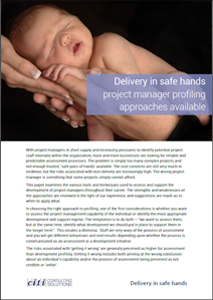 With project managers in short supply and increasing pressures to identify potential project staff internally within the organisation, more and more businesses are looking for reliable and predictable assessment processes. The problem is simply too many complex projects and not enough trusted, 'safe pairs of hands' available. The cost concerns are still very much in evidence, but the risks associated with non-delivery are increasingly high. The wrong project manager is something that some projects simply cannot afford.
With project managers in short supply and increasing pressures to identify potential project staff internally within the organisation, more and more businesses are looking for reliable and predictable assessment processes. The problem is simply too many complex projects and not enough trusted, 'safe pairs of hands' available. The cost concerns are still very much in evidence, but the risks associated with non-delivery are increasingly high. The wrong project manager is something that some projects simply cannot afford.
This paper examines the various tools and techniques used to assess and support the development of project managers throughout their career. The strengths and weaknesses of the approaches are reviewed in the light of our experience, and suggestions are made as to when to apply what.
In choosing the right approach to profiling, one of the first considerations is whether you want to assess the project management capability of the individual or identify the most appropriate development and support regime. The temptation is to do both - "we want to assess them, but at the same time, identify what development we should put in place to support them in the longer term". This creates a dilemma. Staff are very wary of the process of assessment and you will get different behaviours and end-results depending upon whether the process is communicated as an assessment or a development initiative.
The risks associated with 'getting it wrong' are generally perceived as higher for assessment than development profiling. Getting it wrong includes both arriving at the wrong conclusion about an individual's capability and/or the process of assessment being perceived as not credible or 'unfair'.









